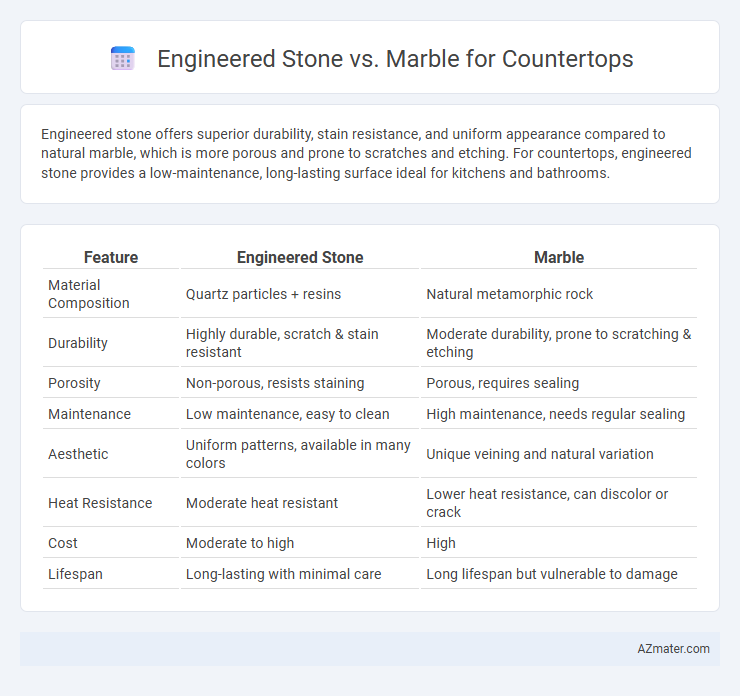Engineered stone offers superior durability, stain resistance, and uniform appearance compared to natural marble, which is more porous and prone to scratches and etching. For countertops, engineered stone provides a low-maintenance, long-lasting surface ideal for kitchens and bathrooms.
Table of Comparison
| Feature | Engineered Stone | Marble |
|---|---|---|
| Material Composition | Quartz particles + resins | Natural metamorphic rock |
| Durability | Highly durable, scratch & stain resistant | Moderate durability, prone to scratching & etching |
| Porosity | Non-porous, resists staining | Porous, requires sealing |
| Maintenance | Low maintenance, easy to clean | High maintenance, needs regular sealing |
| Aesthetic | Uniform patterns, available in many colors | Unique veining and natural variation |
| Heat Resistance | Moderate heat resistant | Lower heat resistance, can discolor or crack |
| Cost | Moderate to high | High |
| Lifespan | Long-lasting with minimal care | Long lifespan but vulnerable to damage |
Introduction to Engineered Stone and Marble Countertops
Engineered stone countertops are composed of crushed quartz mixed with resin, offering superior durability, stain resistance, and a consistent appearance compared to natural materials. Marble countertops, formed from metamorphic limestone, provide a unique, elegant aesthetic with natural veining but require more maintenance due to porosity and susceptibility to scratches and stains. Choosing between engineered stone and marble depends on the priority of durability versus natural beauty in kitchen or bathroom design.
Composition and Material Differences
Engineered stone countertops are composed of approximately 90% crushed quartz mixed with resins and pigments, providing enhanced durability and stain resistance compared to natural marble. Marble is a metamorphic rock primarily made of calcite or dolomite, which is softer and more porous, making it susceptible to scratches and acid etching. The synthetic composition of engineered stone allows for greater consistency in color and pattern, while marble offers unique, natural veining due to its geological formation.
Appearance and Design Variety
Engineered stone offers a wide range of appearance options, mimicking natural marble with consistent patterns and colors ideal for modern design preferences. Marble provides unique, natural veining and color variations that create a timeless, luxurious look but with less uniformity across slabs. The design variety in engineered stone allows for customized finishes and colors, enhancing versatility for contemporary countertop aesthetics.
Durability and Strength Comparison
Engineered stone countertops offer superior durability and strength compared to marble, as they are composed of resin and crushed natural quartz, making them highly resistant to scratches, stains, and impact. Marble, while prized for its natural beauty, is softer and more porous, resulting in greater susceptibility to chipping, etching, and staining over time. For long-lasting, low-maintenance surfaces, engineered stone provides a more resilient alternative ideal for high-traffic kitchen environments.
Maintenance and Cleaning Requirements
Engineered stone countertops require minimal maintenance due to their non-porous surface, making them highly resistant to stains, scratches, and bacterial growth, and they can be easily cleaned with mild soap and water. Marble countertops, being porous, demand regular sealing to prevent staining and etching from acidic substances, with cleaning needing gentle, pH-neutral cleaners to maintain their polished appearance. The durability of engineered stone reduces long-term upkeep costs, while marble's maintenance needs may increase over time due to its susceptibility to damage and staining.
Stain and Scratch Resistance
Engineered stone outperforms marble in stain and scratch resistance due to its non-porous surface and durable composition of resin and crushed quartz. Marble, composed of natural calcium carbonate, is more susceptible to staining from acidic substances and scratches from daily use. Choosing engineered stone ensures a low-maintenance countertop that maintains its appearance despite frequent exposure to common kitchen elements.
Cost and Value Considerations
Engineered stone countertops typically cost between $50 and $100 per square foot, offering a budget-friendly alternative to marble, which ranges from $75 to $250 per square foot depending on quality and origin. Engineered stone provides substantial value with its durability, stain resistance, and low maintenance, whereas marble, while luxurious and unique, often requires regular sealing and careful upkeep that can increase long-term costs. Choosing engineered stone delivers consistent aesthetics and durability at a lower total cost of ownership, making it a practical investment for homeowners focused on cost-effectiveness and lasting value.
Environmental Impact and Sustainability
Engineered stone countertops typically have a lower environmental impact than marble due to their use of recycled materials and less intensive quarrying processes. Marble extraction involves significant habitat disruption and energy consumption, contributing to higher carbon emissions and resource depletion. Engineered stone's longer lifespan and resistance to wear reduce the need for frequent replacement, enhancing its sustainability profile.
Installation Process and Flexibility
Engineered stone countertops offer a streamlined installation process due to their consistent size, thickness, and lightweight composition, which minimizes the need for extra support or customization. Marble installation is more complex and time-consuming, requiring careful handling due to its natural variations and fragility, often demanding reinforced cabinetry and professional expertise to prevent cracking. Engineered stone provides greater flexibility in design and shape, allowing for seamless edges and cutouts, while marble's natural veining limits cutting options and increases the risk of damage during installation.
Pros and Cons: Engineered Stone vs Marble
Engineered stone countertops offer superior durability, stain resistance, and low maintenance compared to marble, making them ideal for high-traffic kitchens. Marble provides a timeless, luxurious aesthetic with unique veining and natural beauty but is prone to scratching, etching, and staining due to its porous composition. While engineered stone resists heat and chemicals better, marble requires regular sealing and delicate care to maintain its appearance over time.

Infographic: Engineered stone vs Marble for Countertop
 azmater.com
azmater.com